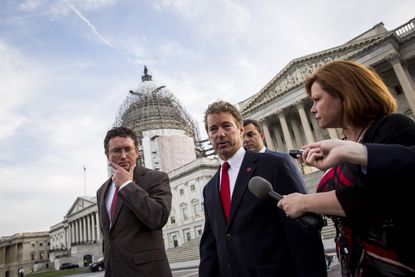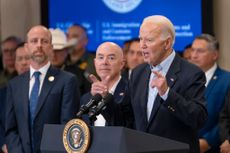Patriot Act's NSA surveillance authority expires at midnight Sunday


Late Sunday, the Senate adjourned after agreeing to vote on (and likely pass) the USA Freedom Act already approved in the House, but Sen. Rand Paul (R-Ky.) blocked immediate action on the legislation for a few days. That means controversial espionage provisions authorized by the USA Patriot Act, allowing bulk National Security Agency collection of U.S. phone metadata, will expire at midnight on Sunday.
The USA Freedom Act, if approved, will reauthorize the bulk metadata collection program with some changes, backed by a large majority of the House and the White House, that will have private phone companies rather than the NSA store the records; NSA analysts will have to get a warrant to access the data. Senate Majority Leader Mitch McConnell (R-Ky.) strongly opposed those changes, and his refusal to allow a vote on the House bill allowed Paul to force the temporary expiration of the NSA powers.
Along with the bulk phone records provision, two others are expiring until the Senate votes: One that helps track "lone wolf" suspects and another that allows eavesdropping on suspects who frequently discard cell phones. The House bill reauthorizes those two with no changes; Paul blocked McConnell's bid to extend the two lesser-known, less-controversial measures. The Senate is expected to pass the USA Freedom Act on Tuesday.
Subscribe to The Week
Escape your echo chamber. Get the facts behind the news, plus analysis from multiple perspectives.

Sign up for The Week's Free Newsletters
From our morning news briefing to a weekly Good News Newsletter, get the best of The Week delivered directly to your inbox.
From our morning news briefing to a weekly Good News Newsletter, get the best of The Week delivered directly to your inbox.
Create an account with the same email registered to your subscription to unlock access.
Sign up for Today's Best Articles in your inbox
A free daily email with the biggest news stories of the day – and the best features from TheWeek.com
Peter has worked as a news and culture writer and editor at The Week since the site's launch in 2008. He covers politics, world affairs, religion and cultural currents. His journalism career began as a copy editor at a financial newswire and has included editorial positions at The New York Times Magazine, Facts on File, and Oregon State University.
-
 India elections start amid violence, hate speech accusations
India elections start amid violence, hate speech accusationsTalking Points Narendra Modi seeks a third term while critics worry about the future of the country's democracy
By Joel Mathis, The Week US Published
-
 'Biden is smart to keep the border-security pressure on'
'Biden is smart to keep the border-security pressure on'Instant Opinion Opinion, comment and editorials of the day
By Harold Maass, The Week US Published
-
 Bird flu worries mount as virus found in milk, cows
Bird flu worries mount as virus found in milk, cowsSpeed Read The FDA found traces of the virus in pasteurized grocery store milk
By Peter Weber, The Week US Published
-
 Israel proposes two-month pause in Gaza war in exchange for all Hamas hostages
Israel proposes two-month pause in Gaza war in exchange for all Hamas hostagesSpeed Read Deal doesn't include an agreement to end war, but might be 'the only path that could lead to a ceasefire', said US officials
By Harriet Marsden, The Week UK Published
-
 Nato official warns of all-out war with Russia in next 20 years
Nato official warns of all-out war with Russia in next 20 yearsSpeed Read Civilians must prepare for life-changing conflict and mass mobilisation, says military chief
By Harriet Marsden, The Week UK Published
-
 Rishi Sunak visits Kyiv to announce £2.5 billion in military support for Ukraine
Rishi Sunak visits Kyiv to announce £2.5 billion in military support for UkraineSpeed Read Surprise trip comes amid increased Russian bombardment and escalation of Middle East crisis
By Harriet Marsden, The Week UK Published
-
 British warship repels 'largest Houthi attack to date' in the Red Sea
British warship repels 'largest Houthi attack to date' in the Red SeaSpeed read Western allies warn of military response to Iranian-backed Yemeni rebels if attacks on ships continue
By Richard Windsor, The Week UK Published
-
 Israel preparing to flood Hamas tunnels with seawater
Israel preparing to flood Hamas tunnels with seawaterSpeed Read IDF pumps could drive out terrorists but critics warn of danger to hostages and Gaza water supply
By Harriet Marsden, The Week UK Published
-
 Houthi rebels claim Red Sea ship attacks
Houthi rebels claim Red Sea ship attacksspeed read Iran-backed Yemeni group vows to escalate aggression towards Israel-linked vessels in revenge for Gaza war
By Harriet Marsden, The Week UK Published
-
 Israel plans next phase of Gaza war as first hostages released
Israel plans next phase of Gaza war as first hostages releasedSpeed read After four-day ceasefire 'we will not stop' until destruction of Hamas, says Israel
By Harriet Marsden, The Week UK Published
-
 Mob storms Russian airport 'looking for Jews'
Mob storms Russian airport 'looking for Jews'Speed Read Plane from Israel surrounded by rioters chanting antisemitic slogans after landing in Russia's Dagestan region
By The Week UK Published